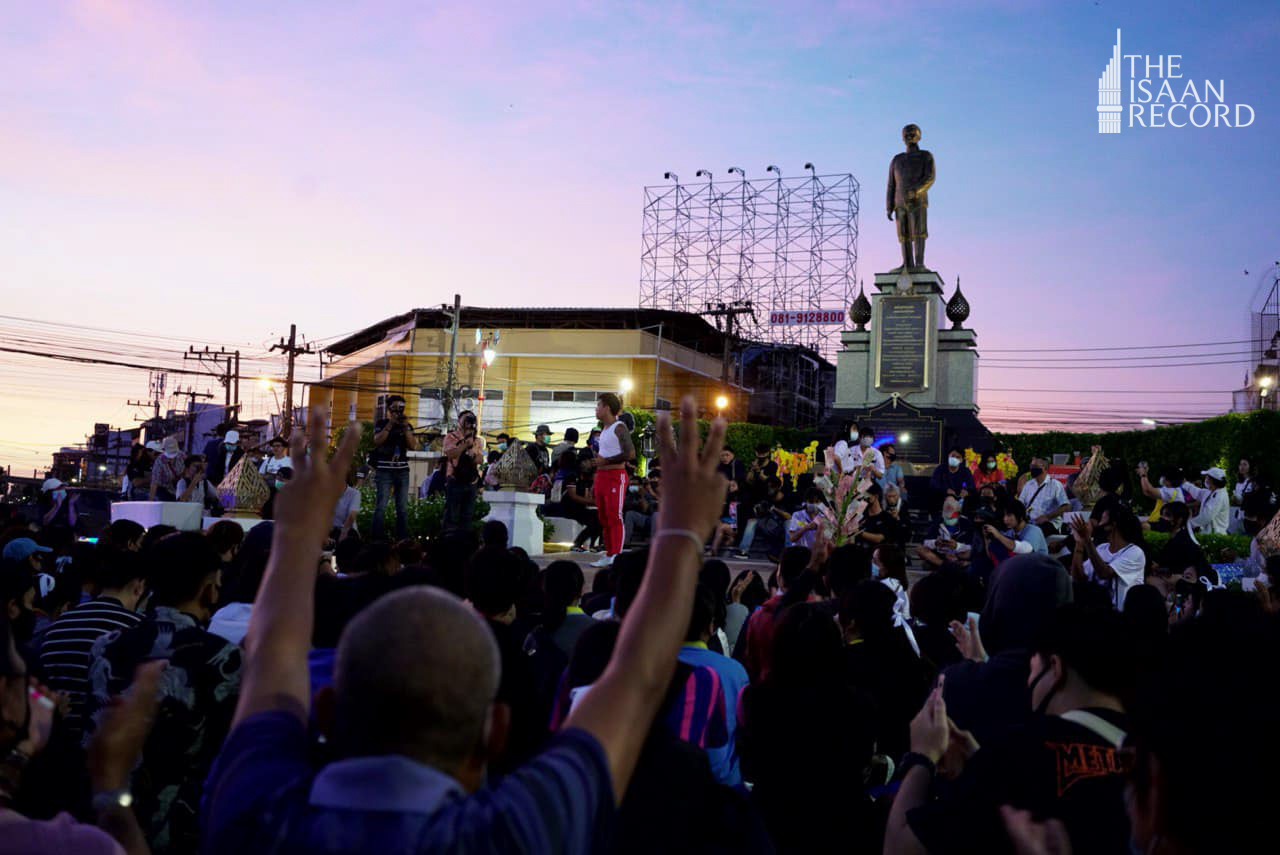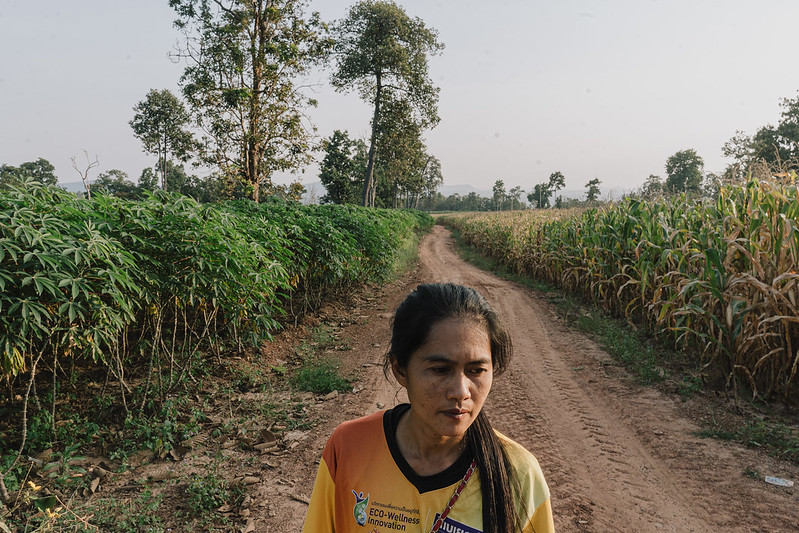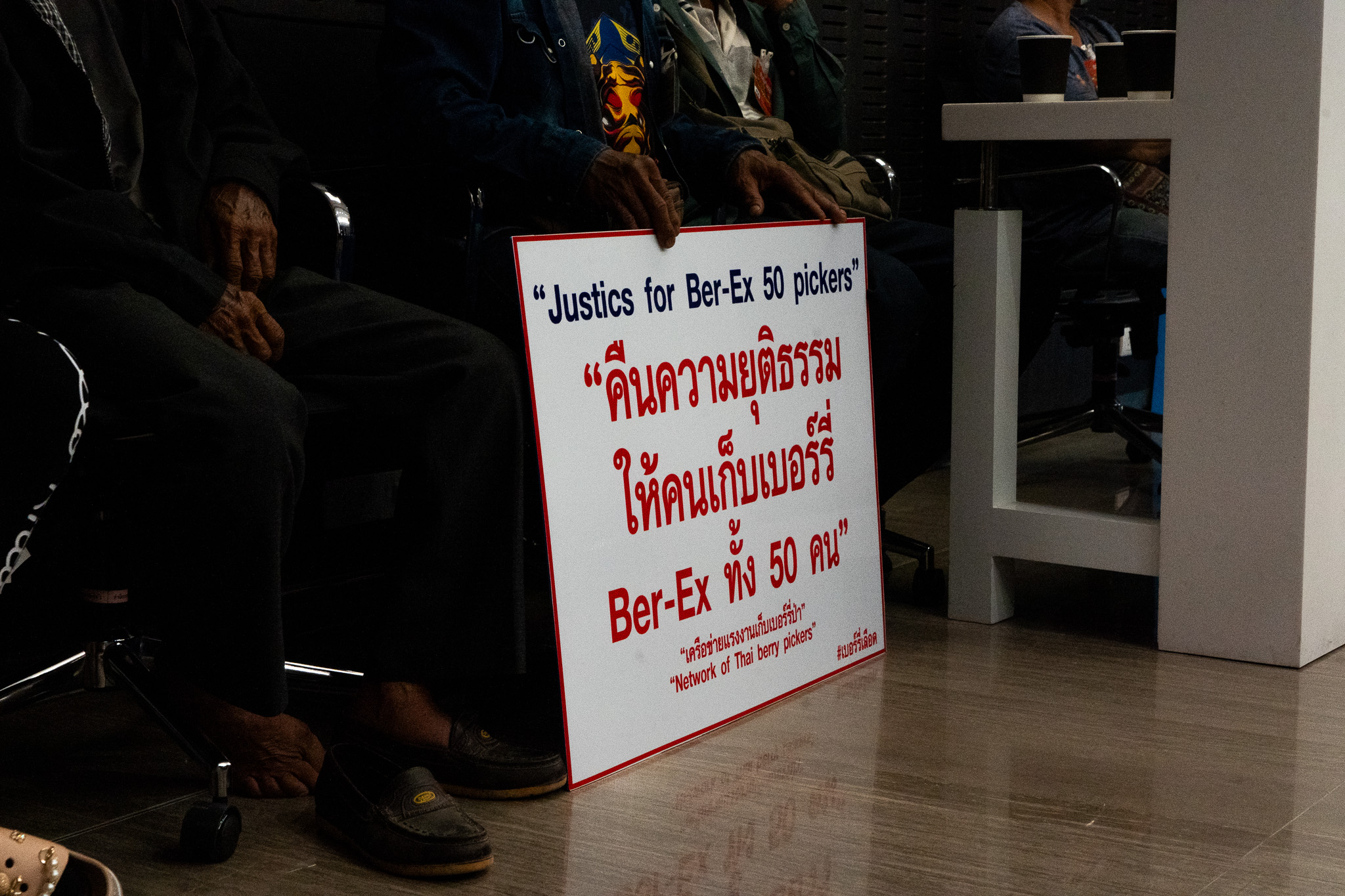
By David Streckfuss
The first two battles over Udon Thani’s symbols—royal portraits and a monument to the city’s patron saint—subsided for the time being, but the one over a national flag continued.
The target of police interest was the Udon’s Had Enough group. When the protest in question occurred, the new group in town was only four days old.
The protest groups in Udon have gone through a few iterations. The first was the Student Liberal Democracy group , led by Udon Thani Rajabhat University students. But the university’s restrictive policies made it difficult for the group to operate, and in mid-October, the Udon’s Had Enough groupwas set up.
Its eight leaders range from 15 to 23. Half are high school students. One just finished high school. Another is just a working youth. They say their strong point is that everyone is treated equally and everyone’s ideas are given respect. They like talking about the “theme” or “gimmick” for upcoming protests.
Group members also agree that their major drawback is time.
It has helped the group that Pachara “Max” Sarntiyakul, 23, had just finished his degree in electrical engineering at Harbin Engineering University in China and unsuspectingly came back just as things were heating up in Thailand. While in the liberal democracy group, it was his job to study the laws and learn what rights the group have. He has also served as the group’s main negotiator with the police and has helped talk with high school administrators when its younger members face problems.

Photograph by Donlawat Sunsuk/The Isaan Record
The group has been assisted by human rights organizations like iLaw and Thai Lawyers for Human Rights (TLHR) who have travelled up to assist the group with legal issues. The group has close connections to Khon Kaen activists like Attapon “Yai” Buaphat who has been charged in the province for sedition, Article 116 of the Criminal Code, for what he had said on stage on October 22.
The third battle: the flag
Within hours of the October 22 protest, the authorities were consumed with tracking down a desecration of national proportions. Someone had carried a flag on the march through the city, a Thai national flag with the words, “Republic of Thailand” written on it.
This single item was as dangerous as could be imagined, a single item that could attract charges of lese majeste, sedition, desecration of the national flag.
The police moved quickly and prepared a meeting to confront a possible culprit: 16-year-old student, Mudmee.
The day after the march, on October 23, the authorities were trying to address the problem of a national flag with the word, “Republic” written onto it. She ended up having to talk to the deputy governor, the police, the school director, her headroom teacher, and the student affairs teacher. That it was arranged on a Saturday seemed like it was a crisis. The deputy governor had looked at photographic evidence and it looked like it might have been Mudmee herself who had been holding that flag. She denied it. One of her teachers confirmed it was not her.
Mudmee was angry, angry that it was officials from her own school who had sent her name to the police, angry that her name was even being bandied about in this way. She asked the police inspector, with “my name being arbitrarily used, can I claim this right? Can I sue for defamation because it was a waste of time and it damaged her reputation? It was not okay.”
Chanon “Atom” Ardnarong, 18, was also in hot water. His parents have been supportive of his political activism but never wanted him to be in front. Now he was. More than Mudmee, Atom was seen by the police as the main culprit behind the flag. They had a video clip showing him “waving the flag,” leading the authorities to believe it was his, and they wanted to know who ordered Atom to do it. They called him every day for days.
Even the regional head of the police came to question his father, an officer of modest rank. Atom admires his father who he sees as an honest cop in service to the public. But he doesn’t appreciate that weight was put to bear on his father.
Max says the issue of the flag became a “primary focus” because “according to the Flag Act, it is sacred.”
“They’re afraid of the “Republic of Thailand” flag” because, Max says, “it had shown up once; they’re afraid it might show up again. They fear the children now more than the adults because the children don’t listen. They’re stubborn children. They’re bad children. They’re unlike the adults, who they can talk to on whatever and they’ll accede.”
In a way, the police had failed in the October 22 protest: they hadn’t been able to stop the march, they hadn’t been able to dissuade protesters from raising the three-finger salute, they had failed to mute protesters from referring to the monarchy, they had not insisted on protesters asking forgiveness of the monument, and a seditious flag had been flown.
So on October 24, the date of the next protest, there were just as many security forces as there were protesters. The authorities couldn’t afford to have a repeat of October 22 where there was a banner for the Royalist Marketplace and a Republic of Thailand flag. Alarmed, Manager online reported that there were marches throughout Udon, threatening to change the governance system of the country, close the roads, shut down the city.
No “turbulence” needed at the royal reception
The next big challenge of the police was to make sure that uninvited and unappreciative groups did not do something untoward in the direction of the king and queen who swung by Udon on November 10.
Just in case, the entire airport was closed for the entire day. Security protocols were lifted for such an auspicious occasion and selected members of the public were allowed to go out on the tarmac and receive the couple.
Since the disastrous results of the October 22 protest, the police had targeted the Udon’s Had Enough group and acted to limit any “turbulence” [ป่วน] the group might create.
On November 8, a police inspector called Atom up, and a common conversation of the time, in his words, went as follows:
“Where are you, Atom?”
“Um, I’m at home.
“I thought you’d gone to Bangkok, to help with the protest.”
“Um, no, older brother.”
“Are you planning anything now?”
“Nope, nothing, older brother.”
“If you’re going to mobilize anything on this, give me a call first. Inform me first. Keep me informed if you’re going to do anything. Please tell me, first.”
But Atom says that in fact they hadn’t been planning anything. Atom says the inspector just wanted to know if the group was going to create any trouble, fearing that they might raise the three-finger salute.

Donlawat Sunsuk/The Isaan Record
At 8 a.m. on the morning of the tenth, Atom’s father opened his door and took a photo and sent it to the worried inspector. Atom asked why they took his picture. He said it was to an order from his superior, so he knew Atom was at home and so they wouldn’t have to suffer the embarrassment of having the police send someone to the house.
“I didn’t want this to trouble my father,” Atom says. “This was my deal.”
Atom was just then taking his uncle to see the doctor at the hospital. His worried parents encouraged him to send photos to the inspector so he’d know he was truly at the hospital. Atom did, taking photos hourly and sending them off to the police.
Across town on the same day, Mudmee was having a similar conversation. The police had been snooping around the neighborhood, approaching her relatives and asking about her. After they parked right in front of her house, she finally approached one of the officers.
She recounts the conversation, using the royal “we/us” when talking with her.
“Did you know that the King is coming on the 10th?”
“I know.”
“Are we going?”
“If I go will I get in trouble? Will there be something happen if I go?”
“He smiled and said, ‘Nothing will happen if you go.’
“So what’s your purpuse in talking with me today? What did you want to talk to me about?”
“I was coming to see whether we’re still in the area. I was thinking we might have gone to Bangkok.”
(“I was a little surprised. I look that old?)
“No. I’m still a high school student.”
“Where do we study? What grade are we?”
“I’m from R.N. Rachinu [school], 11th grade…How long ago did you get the order to come here?”
“I just got the order and I came to find us right off.”
It was intimidating to Mudmee, but it was also “getting annoying.”
At first her mother tried to see the positive side: “Well, that’s good. It’s like we have security guards watching over our house.”
Later, though, Mudmee’s mother started complaining, “I told you not to get involved. But you did and now see where it’s got us!”
From then on, Mudmee says, her mother tried to keep her from doing any activism. She just wanted her daughter to quit her involvement entirely.
Max was a bit dicier with his handlers. He insisted that if they wanted him to take a photo so they could verify where he was, the police would have to send someone in uniform and they’d take a picture together. If the policeman was not uniformed, Max told them that he wouldn’t cooperate. The police in the end complied, and Max was able to attain his goal: one photo with a uniformed policeman and one where he wore his dinosaur costume, and in each giving the three-finger salute.
Symbols and a ticking clock
These battle over symbols are taken quite seriously with those who live (and rule) by them. The king’s visit was taken of supreme importance in the civic life of the province. The greatest honor was a hastily written note of the king thanking his hosts.
To mark the event, 20,000 copies of an honorary volume were printed up and presented to leading government officials, including all 20 district officers who held the “royal portrait” (on the cover of the volume) in a ceremony that was of sufficient import that the Bangkok publication, the Manager, had to cover it.

The hand-written note was to be preserved and no doubt will end up in the city museum. The honorary volumes were loaded up so that government officials could distribute it to deserving citizens throughout the province.
The final sentence of the note is revealing. The King thanks the local government for “maintaining the magic of Thainess.”
It’s a curious phrase. It in some ways goes to the heart of the issue: students represent a new Thailand and a sense of “Thainess.” The conservatives want to preserve Thainess, even as it disintegrates before their eyes. The harder they clinch, the more strident students strike back

Max is hopeful for the future. In the past, he says, Udon Thani had become known as “the capital of the redshirts.” He appreciates what they had done and he believes that his movement will make Udon “the capital of democracy.”
He recognizes the difficulties for the movement but believes that “time is on our side.”
He smiles confidently and says, “Whatever disadvantages we might have the one thing that the state can’t distort is time.And it’s time itself that will take us to our destination.”




